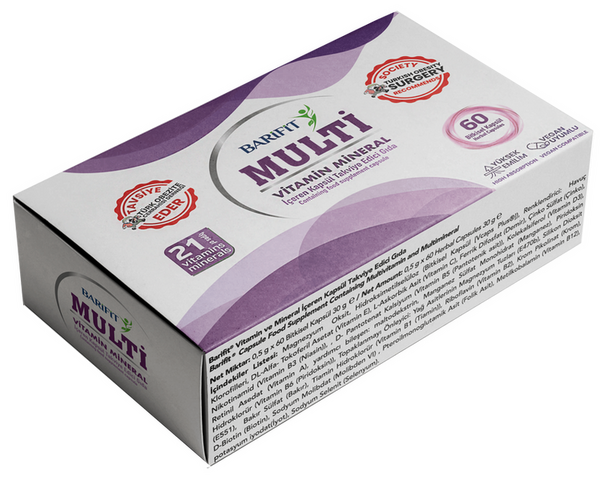Categories
BARİFİT® CAPSULE MULTIVITAMIN SUPPLEMENT
With its rich vitamin and mineral content, it contributes to energy formation metabolism, protection of normal muscles and bones, and normal function of the immune system.
Reference: T.C. Resmi Gazete. Türk Gıda Kodeksi Beslenme Ve Sağlık Beyanları Yönetmeliği. 26.01.2017. Sayı : 29960
Reference: T.C. Resmi Gazete. Türk Gıda Kodeksi Beslenme Ve Sağlık Beyanları Yönetmeliği. 26.01.2017. Sayı : 29960
 High Bioavailability
High Bioavailability 21 Types of Vitamins and Minerals
21 Types of Vitamins and Minerals Enriched Content
Enriched Content Capsule Form
Capsule Form
Contents
It is a Supplementary Food in Capsule Form Containing 21 Kinds of Multivitamins and Multiminerals
vitamins
Quantity / 1 Tablet
Vitamin A
1000 µg (RE)
Vitamin B1
1,5 mg
Vitamin B2
1,7 mg
Vitamin B3
30 mg (NE)
Vitamin B5 (Pantotenik Asit)
10 mg
Vitamin B6 (Piridoksin)
4 mg
Biotin
600 µg
Folic acid
400 µg
Vitamin B12 (Kobalamin)
350 µg
Vitamin C
60 mg
Vitamin D
25 µg
Vitamin E
15 mg (α-TE)
Minerals
Quantity / 1 Tablet
İyot
150 µg
Iron
14 mg
Zinc
15 mg
Magnesium
60 mg
Copper
1000 µg
Chromium
120 µg
Molybdenum
200 µg
Selenium
70 µg
Vitamin And Minerals
Vitamins, are organic compounds that are not synthesized at a rate in the body, are necessary for life, and stimulate important reactions in cell metabolism in very small amounts. Vitamins are essential for maintaining human health. Mineralsare inorganic substances commonly seen in nature. Minerals are needed for the growth and development of the body, for the maintenance of life and for the protection of health.
Reference: Samur G. ‘’Vitamin Mineraller ve Sağlığımız’’, Sağlık Bakanlığı, Şubat 2008, Ankara
Reference: Samur G. ‘’Vitamin Mineraller ve Sağlığımız’’, Sağlık Bakanlığı, Şubat 2008, Ankara
Vitamins
A B1 B2 B3 B5 B6 B12 C D K Choline Biotin Folate
- Contributes to normal iron metabolism.
- Contributes to the protection of normal mucosa.
- Contributes to the protection of normal skin.
- Contributes to the preservation of normal vision.
- Contributes to the normal function of the immune system.
- It has a role in cell specialization.
- Contributes to normal energy-yielding metabolism.
- Contributes to the normal function of the heart.
- Contributes to normal energy-yielding metabolism.
- Contributes to the protection of normal mucosa.
- Contributes to the maintenance of normal red blood cells.
- Contributes to the protection of normal skin.
- Contributes to the preservation of normal vision.
- Contributes to the normal metabolism of iron.
- Contributes to the reduction of fatigue and exhaustion.
- Contributes to normal energy-yielding metabolism.
- Contributes to the protection of normal mucosa.
- Contributes to the protection of normal skin.
- Contributes to the reduction of fatigue and exhaustion.
- Contributes to normal energy-yielding metabolism.
- Contributes to the normal synthesis and metabolism of steroid hormones, vitamin D and some neurotransmitters.
- Contributes to the reduction of fatigue and exhaustion.
- Contributes to normal energy-yielding metabolism.
- Contributes to normal cysteine synthesis.
- Contributes to normal homocysteine metabolism.
- Contributes to normal protein and glycogen metabolism.
- Contributes to the formation of normal red blood cells.
- Contributes to the normal function of the immune system.
- Contributes to the reduction of fatigue and exhaustion.
- Contributes to normal energy-yielding metabolism.
- Contributes to normal homocysteine metabolism.
- Contributes to normal red blood cell formation.
- Contributes to the normal function of the immune system.
- Vitamin B12 contributes to the reduction of fatigue and fatigue.
- Vitamin B12 has a role in cell division.
- It contributes to the maintenance of the normal function of the immune system during and after intense physical exercise.
- Contributes to normal collagen formation, which is essential for the normal function of blood vessels, bones, cartilage, teeth, gums and skin.
- Contributes to normal energy-yielding metabolism.
- Contributes to the normal function of the immune system.
- Contributes to the reduction of fatigue and exhaustion.
- Contributes to the regeneration of the reduced form of vitamin E.
- Improves iron absorption.
- Contributes to the normal absorption/use of calcium and phosphorus.
- Contributes to normal blood calcium level.
- Contributes to the maintenance of normal bones.
- Contributes to the maintenance of normal muscle function.
- Contributes to the preservation of normal teeth.
- Contributes to the normal function of the immune system.
- It has a role in cell division.
- Contributes to normal blood coagulation.
- Contributes to the maintenance of normal bones.
- Contributes to normal homocysteine metabolism.
- Contributes to normal lipid metabolism.
- Contributes to the maintenance of normal liver function.
- Contributes to normal energy-yielding metabolism.
- Contributes to normal macronutrient metabolism.
- Contributes to the protection of normal hair.
- Contributes to the protection of normal mucosa.
- Contributes to the protection of normal skin.
- Contributes to normal amino acid synthesis.
- Contributes to normal blood formation.
- Contributes to normal homocysteine metabolism.
- Contributes to the normal function of the immune system.
- Contributes to the reduction of fatigue and exhaustion.
- It has a role in cell division.
Minerals
Magnesium Iron Zinc Copper Chrome Selenium Calcium Iodine Molybdenum Manganese
- It contributes to the reduction of fatigue and exhaustion.
- Contributes to electrolyte balance.
- Contributes to normal energy-yielding metabolism.
- Contributes to normal muscle function, protein synthesis, maintenance of bones and teeth.
- It has a role in cell division.
- Contributes to normal energy-yielding metabolism.
- Contributes to the normal formation of red blood cells and hemoglobin.
- Contributes to normal oxygen transport in the body.
- Contributes to the normal function of the immune system.
- Contributes to the reduction of fatigue and exhaustion.
- It has a role in cell division.
- Contributes to normal acid-base metabolism.
- Contributes to normal carbohydrate metabolism.
- Contributes to normal DNA synthesis.
- Contributes to normal macronutrient metabolism.
- Contributes to the normal metabolism of fatty acids.
- Contributes to the normal metabolism of vitamin A.
- Contributes to normal protein synthesis, maintenance of bones, hair, nails and skin.
- Contributes to the preservation of normal vision.
- Contributes to the normal function of the immune system.
- It has a role in cell division.
- Contributes to the protection of normal connective tissues.
- Contributes to normal energy-yielding metabolism.
- Contributes to normal skin and hair pigmentation.
- Contributes to the normal function of the immune system.
- Contributes to normal macronutrient metabolism.
- Contributes to the protection of normal hair and nails.
- Contributes to the normal function of the immune system.
- Contributes to normal thyroid function.
- Contributes to normal energy-yielding metabolism.
- Contributes to normal muscle function.
- Contributes to the normal function of digestive enzymes.
- It has a role in cell division and specialization process.
- Necessary for the preservation of normal bones and teeth.
- Contributes to normal energy-yielding metabolism.
- Contributes to the protection of normal skin.
- Contributes to the normal production of thyroid hormones and normal thyroid function.
- It contributes to the normal metabolism of sulfur-containing amino acids.
- Contributes to normal energy-yielding metabolism.
- Contributes to the maintenance of normal bones.
- Contributes to the normal formation of connective tissue.
Prepared by
T-Soft
E-Commerce.


